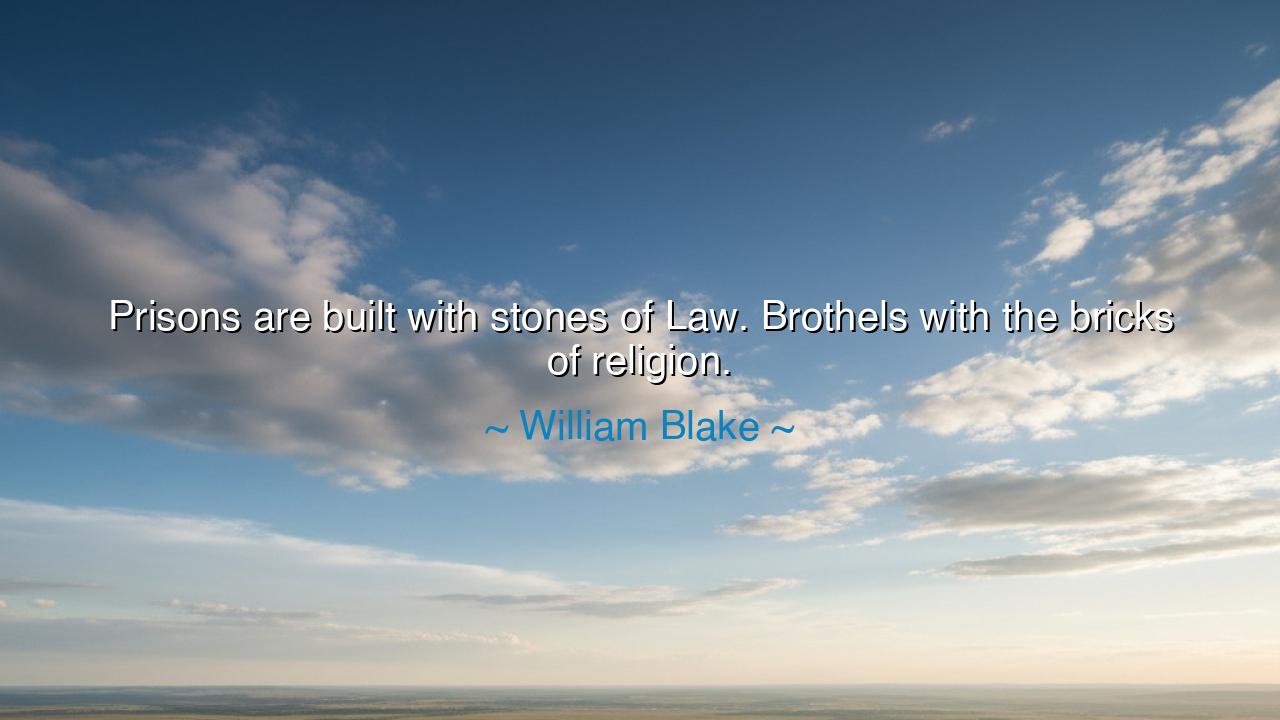
Prisons are built with stones of Law. Brothels with the bricks of






“Prisons are built with stones of Law. Brothels with the bricks of Religion.” Thus wrote William Blake, the prophet-poet of England, who saw with burning eyes the hypocrisy of his age and dared to speak its hidden truth. These words, drawn from his Proverbs of Hell in The Marriage of Heaven and Hell (1790), are not a curse upon law or faith themselves, but upon their corruption. Blake, like a fire in the midst of a dark century, sought to awaken humanity from the chains of moral pretense. His vision was clear and terrible: that when Law loses compassion, it builds Prisons, and when Religion loses love, it builds Brothels—for every virtue, when hardened into tyranny, breeds the very vice it seeks to destroy.
To understand this paradox, one must know the world from which Blake spoke. Eighteenth-century England was a land of iron restraint. The poor were bound by harsh laws, the rich excused by power, and the Church preached virtue while turning away from the suffering of the people. Blake looked upon this society and saw its rot hidden beneath the veneer of righteousness. He saw that Law, when devoid of mercy, becomes not a guide but a cage—an edifice of punishment built from the stones of pride and judgment. And he saw that Religion, when reduced to dogma and fear, becomes not a sanctuary but a trade—a market of hypocrisy where the spirit is sold for appearance’s sake. Thus he wrote these immortal lines, to remind the world that even the holiest institutions can become instruments of oppression when the heart has forgotten love.
The “stones of Law” represent the rigid, unyielding rules of men who mistake order for justice. When laws are made without compassion, when they serve power instead of truth, they cease to protect and begin to imprison. History offers countless examples: the debtor’s prisons of old England, where men rotted behind bars for pennies; or more broadly, the tyrannies of nations that enslaved their own citizens in the name of “law and order.” Even today, we see such prisons built—not always of stone, but of policies and indifference—walls that separate the privileged from the powerless. Blake’s words cry out across time: law without love becomes the architecture of bondage.
And what, then, of the “bricks of Religion” from which brothels are built? Here Blake strikes at hypocrisy—the pretense of holiness that hides corruption. He saw how those who preached chastity often trafficked in desire, how those who condemned sin secretly profited from it. Religion, when sincere, is a bridge between man and the divine. But when it becomes an instrument of control, it breeds the very lusts it forbids. A society that represses natural joy, that condemns the body as impure, often drives that desire underground—until it erupts in secret, in darkness, in shame. Thus, the brothel, for Blake, is not merely a place of flesh—it is the spiritual consequence of hypocrisy. Every brick of false piety builds the walls of vice.
Consider the story of Victorian England, that later age which wore virtue like a mask. The streets preached morality by day and whispered corruption by night. Under the gaze of the church, thousands of women were forced by poverty into degradation, while the very men who condemned them visited them in secret. Laws were made to punish the fallen, not to heal them; sermons were spoken to preserve appearance, not to cleanse the heart. Blake, though long gone, had already foreseen this moral disease—the twisted offspring of law and religion divorced from love. He saw that when systems of virtue forget the humanity they serve, they give birth to their opposites.
Yet Blake’s words are not nihilism—they are a call to awakening. He believed that both Law and Religion were meant to serve the liberation of the soul, not its imprisonment. In their true form, they are not chains, but paths: Law to guard justice, Religion to nourish spirit. But when men turn them into weapons, when they cling to rules and rituals instead of truth, these paths turn to prisons and brothels of the soul. Thus, the poet urges us to see beyond the forms of righteousness, to reclaim the living fire of imagination, compassion, and inner freedom.
So, my child of the ages, take this lesson to heart: Do not worship the structure—seek the spirit within it. Do not mistake Law for justice, nor Religion for holiness. The moment they cease to serve love, they serve corruption. Let your morality be born not from fear, but from understanding. Let your faith be rooted not in dogma, but in kindness. Build no prisons with your judgments; build no brothels with your hypocrisy. Instead, make of your life a temple of truth—a place where the laws of compassion and the light of sincerity dwell together.
For in the end, Blake’s words are not condemnation but prophecy. He calls upon every generation to purify its institutions, to rebuild the walls of Law and Religion not with stones of pride or bricks of fear, but with the living mortar of mercy. When love reigns, there will be no prisons, for justice will heal before it punishes. When truth reigns, there will be no brothels, for desire will be sanctified by understanding. The world will be free not when it is ruled by Law or Religion alone, but when both bow before the power of the human soul made whole.






AAdministratorAdministrator
Welcome, honored guests. Please leave a comment, we will respond soon